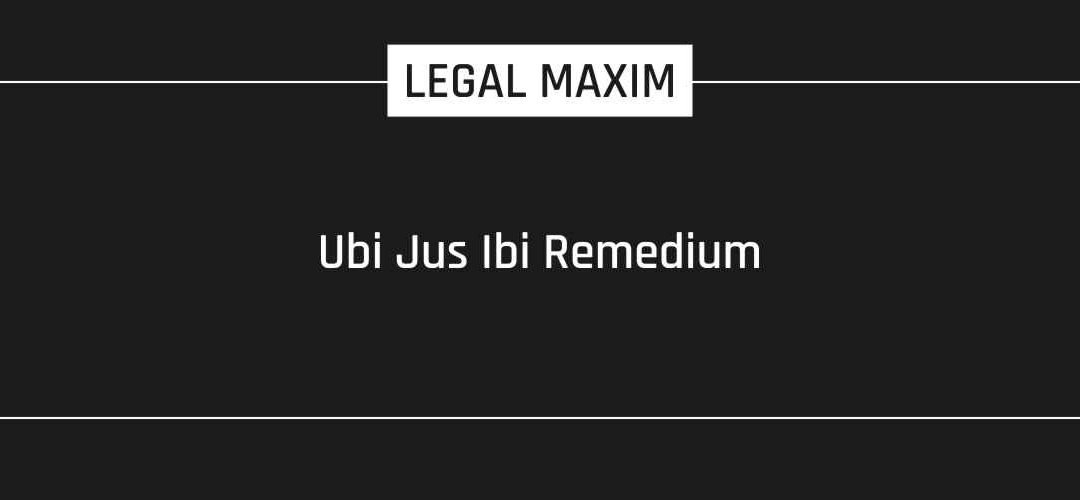Literal Meaning
Where there is a wrong, there is a remedy.
Origin
Latin
Explanation
The maxim states that if any wrong has been committed, the law provides a remedy. In simple terms, the law specifies a remedy for every wrong. It shall also be described as the principle that no wrong should be allowed to go without any compensation if it can be redressed by a court of law. According to the law, wrong actions are those which are not prescribed by moral rules or which are prohibited by law. When a person’s right is denied, the law affords the remedy of an action for its enforcement. Thus, this right to a remedy includes a right of action. The maxim also states that the person whose right has been infringed has the right to enforce the infringed right through any action before the court.
The Law of Tort is a development of the Latin Maxim Ubi jus ibi remedium. The term jus in the maxim refers to the legal authority to do something or demand something, whereas the term remedium refers to the right of a person to approach the court for the wrong done to him. It is to be noted that the maxim applies only to the cases where a legal wrong has been done to a person and not for the moral or political wrongs.
Applicability
The applicability or the essentials of the maxim includes
- To be applicable where there is a right which is recognized by the law.
- To the wrongful act which violates the legal rights of the person.
- To be applicable when sufficient relief has not been provided by the court.
- To be applicable if there is a legal injury.
Exceptions
Although the maxim denotes that every wrong has equity of remedy provided by the law, it shall not be applicable in the following cases:
- To moral and political wrong which are not actionable.
- To breach of marriage vows or personal commitment without consideration.
- To those who do not have legal damage.
Illustration
A cloak tower fell due to the negligence on part of the Municipal corporation thereby injuring various people. The injured people have the right to ask for a suitable remedy in the law court.
Case Laws
In Sardar Amarjit Singh Kalra vs. Promod Gupta & Ors., the Supreme Court held that the maxim ‘Ubi jus ibi remedium’ is recognized as a basic principle of the theory or philosophy of law and that courts have to protect and maintain the right of parties and help them instead of denying them relief.
In Bhim Singh v. State of Jammu & Kashmir, the petitioner was MLA of Jammu and Kashmir parliamentary assembly. While he was on his way to attend the parliamentary session, he was wrongfully arrested by a police officer and he was restrained from attending the parliamentary session. He was not presented before the magistrate in time and he had a legal right to attend the meeting. His fundamental right under Article 21 of the Constitution was also violated. The Supreme Court held that the defendants were responsible and awarded Rs.50,000 as compensation to the petitioner for the infringement of his fundamental right.
In Shivkumar Chadha vs. Municipal Corporation of Delhi, the Supreme court held that where statutory enactments do not provide any remedy but only creates rights and liabilities if any person complains of his rights being violated or wrongly affected such person can approach the civil court based on the principle of legislation that where there is a right, there is a remedy.
In the case of Asbhy vs. White, Ashby was a qualified voter, however, he was stopped from voting in the parliamentary elections. The candidate he wished to vote for, won the election. Now the question arose that whether the right has been infringed and if the answer is in affirmative can he ask for remedy? The court held that though the plaintiff has suffered no damage as the candidate he wished to vote for, won the election but the legal right of the plaintiff has been violated and he is entitled to enforce the right. The maxim ubi jus ibi remedium was applied in the case and compensation was provided to the petitioner.
This Maxim has been written and submitted by Ms. Nidhi Chillar during her course of internship at B&B Associates LLP. Ms. Nidhi is a third-year law student at the Vivekananda Institute of Professional Studies, New Delhi, Delhi.

Thank You So Much.
Helpful.thanks a lot.
Thanku so much!! The maxim helped me a lot!!
Very helpful 👍
Thanks for the work, we from thelegalpedia.com appreciates so much for this wonderful piece.